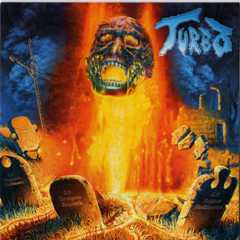Turbo - Awatar (2001/2020)
Turbo - Awatar (2001/2020)

1 Armia 4:26 2 Upiór W Operze 5:46 3 Sen 4:31 4 Granica 4:33 5 LSD 5:29 6 Katatonia 5:25 7 Awatar 5:13 8 Embrion 5:09 9 Fałsz 4:56 + 10 Burn 4:27 11 Lęk 4:43 12 When A Blind Man Cries 3:40 13 Neon Knights 3:48 14 Lęk 3:47 15 Bramy Galaktyk 4:14 16 Dream 4:30 Bass Guitar, Music By, Lyrics By – Bogusz Rutkiewicz Guitar, Acoustic Guitar, Music By, Lyrics By – Wojciech Hoffmann Percussion – Mariusz Bobkowski Vocals, Backing Vocals, Music By, Lyrics By, Design Concept – Grzegorz Kupczyk
„Awatar” to płyta, która wyszła dziewięć lat po poprzedniej produkcji Turbo „One Way”. W tym okresie zespół przez pewien czas nie istniał, a składy zmieniały się dynamicznie. Ostatecznie Wojciechowi Hoffmanowi udało się skompletować klasyczne zestawienie z Grzegorzem Kupczykiem i Boguszem Rutkiewiczem, a na perkusji zagrał Mariusz Bobkowski. Po latach Turbo wróciło na scenę.
Po takiej przerwie nazbierało się materiału i nie powinno dziwić, że jest tu trzynaście utworów, choć aż trzy z nich to są covery. „Awatar” został wydany w dwóch wersjach językowych. Ja mam tą angielską i na jej podstawie piszę recenzję. Na obu jednak muzyka jest ta sama i jest jej najbliżej do thrashu, choć ma on takie heavy metalowe zabarwienie. Muszę jednak stwierdzić, że nie jest to zbyt urzekająca płyta i na mnie nie robi większego wrażenia.
Zacznę może od tego, że brakuje tu przebojów. Wokalizy są mało porywające, a niektóre refreny, jak w „Army” czy „Spectre In The Opera”, wręcz słabe. Najlepiej pod tym względem wypada „The Limit”, potem „Awatar”, ale takich fajniejszych, wpadających w ucho, fragmentów jest tu jak na lekarstwo. Większość przemija po prostu poprawnie, lecz bez dreszczyka emocji.
Podobnie jest z muzyką. Właściwie ciężko się do czegoś przyczepić. Panowie grają metal i wychodzi on dobrze. Dźwięki są składne, riffy mocne, perkusja na swoim miejscu, ale to wszystko. Jakoś nie mogę się w to odpowiednio wkręcić. Ciekawszym numerem jest na pewno „Embryo”. Jest najmocniejszy i ma sporo wariacji instrumentalnych. Tak więc plusy na pewno są.
Po nim następuje „Deceit”, który w spisie treści jest pomylony z jedenastym „Fright”. Również mocna pozycja, kończąca podstawową część albumu. Później mamy jeszcze dwa covery Deep Purple, jeden Black Sabbath oraz balladę „Fright”, która, w połączeniu z „When A Blind Man Cries” Purpli, tworzy taką część sentymentalną. Trzeba przyznać, że te przeróbki są dobrze zrobione i oddają ducha oryginałów. Szczególnie w „Neon Knights” momentami dosłownie mam wrażenie, że to śpiewa Dio. Niestety słychać też różnicę w poziomie takiego kawałka z produkcją własną.
Mimo pewnego narzekania, na które sobie pozwoliłem, nie mogę nie stwierdzić, że „Awatar” jest dobrą płytą. Wciąż jednak mi się wydaje, że nie ma do końca rozwiniętych skrzydeł, że można by ją jeszcze podrasować. A może to tylko mi się tak wydaje? ---Wujas, darkplanet.pl
I'm going to go out on a limb and say Turbo is one of the most underrated bands ever. Even though most metal fans are probably unfamiliar with them, Turbo has actually been an active force in the Polish metal scene over the last twenty years. The band's style of bloodthirsty thrash was made famous throughout Poland until the early nineties when Turbo mysteriously decided to call it quits. After a near decade of hiatus, Turbo reunited, but with a slight change under their belts. The band's first record since their reunion was "Awatar," which seemed great at first for all those that supported them, but hardcore fans of the band were surprised by Turbo's decision to substitute thrash for their main inspiration: traditional heavy metal.
Turbo decided to abandon most of their thrash elements by switching to a traditional metal sound on "Awatar," and I believe it was a successful transition. The overall music isn't as fast as some of Turbo's previous material, but most of the songs manage to sound enjoyably heavy. The riffing is focused around Turbo's native style of heavy metal with small touches of prog and thrash. Fans of thrash will probably enjoy the middle of "Spectre in the Opera" when Turbo launches a monster thrash riff that has Slayer worship written all over it. This is, however, one of the few examples of thrash on this LP; there are small portions of thrash riffing throughout the course of this album, but most of the featured guitar work resembles Turbo's traditional metal roots the most.
The drumming isn't anything special since it's just a generic percussion performance of simple patterns and the occasional double bass pedal. Bassist Bogusz Rutkiewicz has a key role in "Awatar" because of his constant involvement throughout the course of the album. There are a surprisingly large amount of bass lines scattered across this record and the clear production makes it easily heard. If you like hearing a lot of bass, this is an essential CD.
Singer Grzegorz Kupczyk vocal performance is good, but he can get a bit carried away at times. Kupczyk has fantastic singing voice that he applies a majority of the time, but sometimes he'll use a low rasp that sounds a bit messy. Now I don't have a problem with deep vocals, but these "growls" sound out of place and poorly performed. Though his growls are lame, Kupczyk's singing voice is a great addition to this record. His normal voice is alike most vocalists in the heavy metal scene because of his ability to nail high notes and make some of the tunes sound a bit emotional or aggressive. Overall, Kupczyk earns points for his normal singing and nothing else.
Even though this isn't the best offering this band has done, "Awatar" is still a decent record with some great qualities. I recommend you check this one out if you like traditional metal or have had previous experiences with Turbo. ---GuntherTheUndying, metal-archives.com
download (mp3 @320 kbs):
yandex mediafire uloz.to solidfiles global.files workupload








